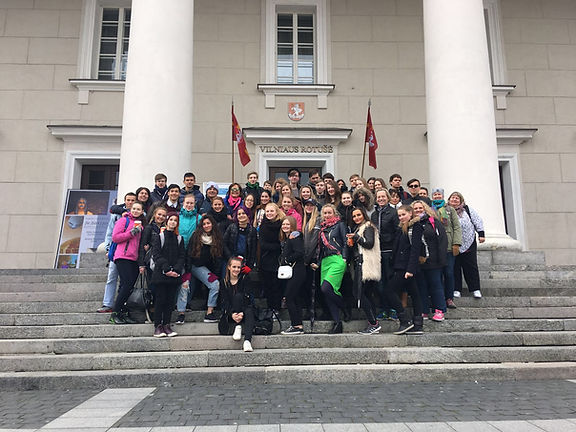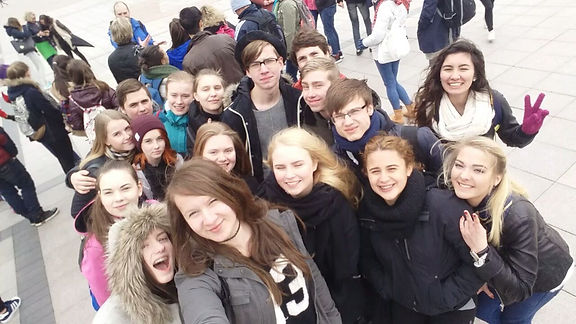
Values ın educatıon teenagers ın actıon
2014 - 2016

The project started on 1st September, 2014 and finished on 31st August 2016. Six countries participated in the project: Lithuania, Norway, Sweden, Finland, Spain and Bulgaria. The international project was named "VETA" and it is an acronym for the English slogan "Values in education, teenagers in action". One of the main goals of the project was to promote and develop students' understanding and awareness of the following 12 topics: tolerance and respect, poverty and solidarity, multiculturalism, safe Internet, road safety, European citizenship, violence and hatred, gender equality, addictions and healthy lifestyle, consumption, human rights, environment and its protection.
Values in Education: Teens in Action!"- the project whose main objectives were the following: to raise awareness among teenagers of 12 shared values and rights as Europeans integrating Values education within the English Subject lessons; to improve the English language as a vehicle for expressing ideas in a creative way; to foster and improve the use of ICT as a tool to work cooperatively; to develop Key Competences.
All the activities that were held in our organisation contributed to the objectives of the project in this way: from a social point of view the activities during mobility in Lithuania represented an immense contribution to the self-awareness of students and to the implementation of ENVIRONMENTAL ISSUES value that is vital and important in nowadays world, the activities enlarged their knowledge about this value and how common environmental issues problems can be dealt within the EU framework. Regarding a cultural approach, students not only had the chance to get in touch with Lithuanian cultural reality by getting to know people from our country, but also had the chance to get familiar with cultural products (dishes, events, films). From a linguistic perspective, students improved their English skills and knowledge practising it in a different context. Furthermore, the project put people in contact with many languages, therefore students realized that nowadays they need English to be a European and world citizen but at the same time knowing other languages is also important. Working and cooperating in transnational teams students raised their interest for other languages besides English. Without doubt the activities implemented in Lithuania contributed to the development and achievement of Key Competences, not only Communicative competence but also Social and Civic Competence, Sense of initiative and Entrepreneurship and Learning to learn. As students had to produce short films according to a given topic on ENVIRONMENTAL ISSUE value debating and working cooperatively, they also enhanced and improved their ICT knowledge organizing filming, editing, subtitling, interviewing.
The project and implemented objectives had a great impact on our institution. The participation of our school in the project contributed to raise cultural awareness of shared values of the local community. Although values are long acquired before this stage through family and other sources, it is the role of schools to foster positive democratic values and to provide students with the opportunity of reflecting upon and identifying appropriate values for their adult life.
It is obvious to mention activities that were prepared by teachers. Each country and teachers working on the project according to intended schedule had to prepare teaching guides for the student-produced videos that could be disseminated and reutilized. (one of the project objectives). The Lithuanian teacher- produced guides on how to exploit the multimedia materials prepared by students on twelve values in class, as an open resource, will allow many other teachers in all Europe to apply these lesson plans in their classes as they are uploaded on projects website and Erasmus + dissemination platform. In this way, the exploitation of materials by other teachers and schools help to raise awareness on the proposed values in other institutions, communities. Also, tests, questionnaires, files prepared by teachers in order to evaluate the progress and advance of the project are public through the website and New Erasmus+ platform for other institutions.

.jpeg)
.jpeg)

